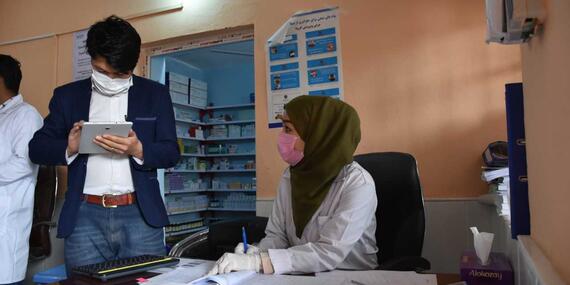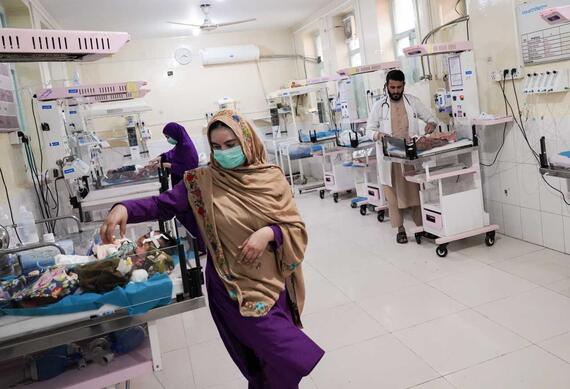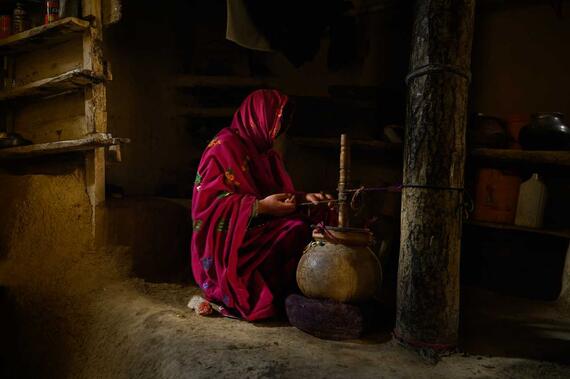Afghan women aid workers risk own lives to keep people alive

Girls must be supported and respected.
“When I was a young girl, I was supported and respected. I did not face these challenges,” says 32-year-old Madina*, who has been the head of an international organization’s sub-office since 2016. Today, she is distraught to see an increasingly restrictive environment for women and girls in Afghanistan since the Taliban de facto authorities took over the country in August 2021.
“Even though the situation was tough before the takeover, the Government, aid agencies, and the international community were working together to improve the rights and welfare of women and girls in Afghanistan. We had hope. However, the fruits of these efforts are being eroded.”
“Our parents taught us that the country is developed by its people including men and women. We studied and worked hard so we could actively contribute to this, and many of us young professional women were beginning to take leadership roles in various sectors. It was good for women, but it also an effective way of upholding Islamic values, if women, mainly those in the medical and education sector can provide essential services to other women and girls.”
We chose to stay and stand by our people.
Madina fears her generation of young professional women’s achievements are being erased by the restrictive measures that confine them to the four corners of their homes.
“Since the takeover, there has been a mass exodus of professional personnel resulting in the loss of skilled workers in essential fields such as health, education, humanitarian sector and others.
“This exodus has left a huge gap and means that the authorities must work to preserve and protect the remaining skilled professionals they have - both men and women - while they train new people.
“Some of us voluntarily chose to stay and stand by our people who need our assistance and support. We did not choose to stay behind to be locked in our houses. I knew my people needed my services.
“Before the 24 December ban, when I went to the office every day, I met women with a similar passion and an unwavering commitment to make a difference in their country.
“But with these bans, we are either stuck in our houses or we take the risk of going out there to save lives. Many families count on us for survival. It is a tough balance between our safety and saving others.”

Working from home is not sustainable.
“Working from home is not the same as working from the office. I am a leader. I manage a big team of at least 100 people scattered across the province. They need my guidance.
“I have a huge responsibility of managing many projects and coordinating with several partners. To effectively sustain our projects, we need all our women and men staff on the ground.
“I try to keep my team together and motivated via virtual communication channels, but women colleagues are always asking how long the ban will last and if they will continue working from home forever. They sometimes go and monitor projects, but we need them on the ground to implement and supervise the work. We shelved plans to expand our programmes due to limited staffing.”
Local authorizations help but are risky.
“Some local authorities have allowed us to continue helping those in urgent need of assistance. They understand that some families are facing difficulties to survive without humanitarian assistance. We appreciate their efforts in trying to facilitate the delivery of aid to people in need. They have facilitated local arrangements that authorize women to visit project sites but do not allow them to go to the office.
“Some of our women aid workers have been able to carry out their work using the home-to-field modality and can assist people through local authorizations which their organizations have secured, but these are not safe for women. In addition, piecemeal solutions are not sustainable and effective.”
The home-to-field modality refers to when local authorities authorize short-term verbal approvals for women to visit project sites in the field without going to their offices.
“Most of those local authorities do not want to be responsible if things go wrong and that is why they only give us verbal permissions that are time-bound.”
“In the meantime, we can only count on their continued support and hope that they will maintain the local authorizations otherwise people will suffer more.
“Those local authorizations are the only way we are keeping many people alive even though they are fragile and do not guarantee safety and protection for women aid workers.”

The situation must change
“I want the situation to change. This is very tough and exhausting for women and girls. Some of our women staff are afraid of losing their jobs. I know that there are several engagements and advocacy efforts underway. We can only hope that the Taliban leadership will soon change their policies and make life easy for women in Afghanistan. We also ask donors to continue supporting us, otherwise without funding many people will be destitute.
*Name has been changed.
